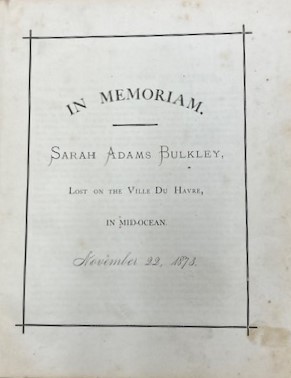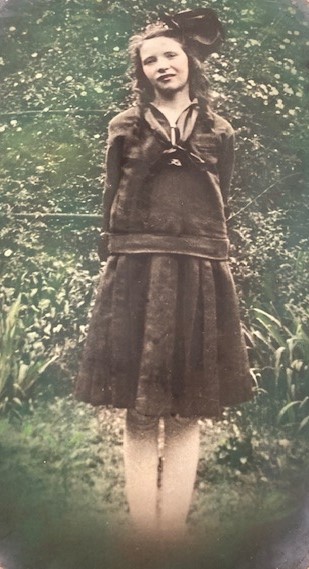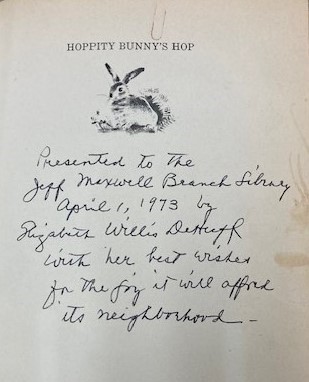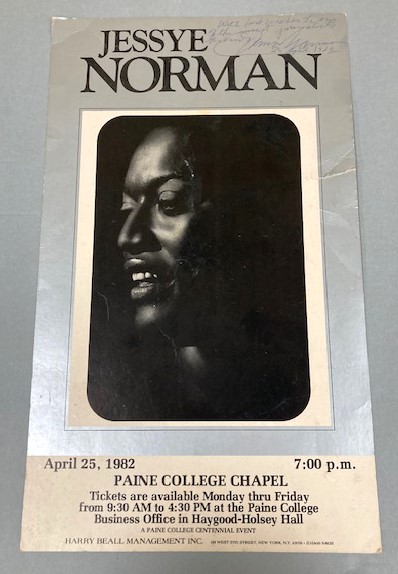Genealogists and researchers lament that women’s stories are often lost to history through a lack of documentary evidence. Often, very little remains to point to individual women’s hopes, dreams and accomplishments. Because of this, fragments can play a part in each individual story.
The Georgia Room is able to preserve pieces of women’s stories which may open the door to later research and discovery. Let’s take a look at some of the fragments left behind in our collection which show women as mourners, moral examples, city representatives, or accomplished writers with established careers.
Barely 21, Sarah “Lallie” Adams Bulkley perished in the sinking of the Ville De Harvre on November 22, 1873. Sarah Adams Bulkley: In Memoriam captures the grief of her mother Mary Keziah Bulkley as she writes the details of the shipwreck and relates her daughter’s last words. This missive, written to preserve Lallie’s memory, has succeeded in its task only by being preserved. The Georgia Room holds a copy of this booklet, along with newspaper clippings.
In 1901 we have another In Memoriam memorializing Lallie’s mother Mary Keziah Adams Bulkley and her grandmother Sarah Susanna Adams. Less desperately sad, the occasion of their memorial is centered on the dedication of the altar at the Church of the Good Shepherd in the Summerville area of Augusta, Georgia. The text is a reprint of the sermon preached at the event. At the close of the sermon, the lives of both ladies are commented on, praising their strong belief in God and their dedication to the church. Having been described as living and working in the domestic sphere, this dedication was a very public acknowledgement of women living very private lives. This fragile piece of memory is in another small booklet preserved in the Georgia Room.
When living her “15 minutes of fame”, Evelyn McDaniel Kennedy was a young graduate of Converse College, Spartenburg, South Carolina and, as the Augusta Chronicle mentioned, “a popular Augusta girl”. Apprised of her appointment as the sponsor of the USS Augusta on January 4, 1930, Evelyn McDaniel expressed thanks over the honor and wondered if she could represent the city to its credit. “I have never had the chance to break a bottle of any kind over anything, especially to christen a ship, but am happy to be selected as sponsor for Augusta.” She admirably carried out her christening duties on February 1, 1930, by breaking a bottle of Savannah River water on the ship. The traditional champagne could not be used since this was the height of prohibition. [4] The Georgia Room holds newspaper clippings of the event, as well as some photographs of Evelyn McDaniel Kennedy and her husband.
Elizabeth Willis DeHuff (1886-1983) was born in Augusta, Georgia and grew up in Beech Island, South Carolina. She graduated from Tubman High School and Lucy Cobb College in Atlanta, Georgia. Having met her husband John DeHuff in the Philippines, she went with him to Santa Fe, New Mexico where she developed a great interest in Native American culture and started her writing career with children’s plays, stories and magazine articles. Living later in Augusta, DeHuff served as President of the Augusta Authors club. While Hoppity Bunny’s Hop is an example of her writing for children, she also wrote a number of genealogical works. An accomplished painter, DeHuff left her mark on the art world as the donor of the Elizabeth Willis DeHuff Collection of American Indian Art housed in the Beinecke Rare Book and Manuscript Library, Yale University.
The Georgia Room holds the copy editor’s draft of Hoppity Bunny’s Hop and a copy of the published work, inscribed by the author.
Ruby Lorraine Radford (1891-1971) was a resident of Augusta, Georgia. Valedictorian of the 1910 class of Tubman High School, she authored more than 50 books, often based around Georgia history. Many of her works featured females as lead protagonists. She also wrote under the pen names Marcia Ford and Matilda Bailey. She was a teacher, an active member of the Augusta community, a member of the Friends of the Augusta Library, and several arts groups. Radford is credited with being a co-founder of the Augusta Authors Club, and was honored as Author of the Year by the Dixie Council of Authors and Journalists in 1969.
The Georgia Room holds the edited first draft of her book, Secret of the Peach Orchard Plantation, as well as correspondence pertaining to its publication. Included also are 25 of her titles which cover her work in both fiction and non-fiction, though our holdings of her works are not complete.
One of the most famous of Augustans, Jessye Norman (1945-2019), the world-renowned operatic diva, has left an unmistakable footprint in history. Acclaimed for her vocal performances and recordings, her accolades are too numerous to list here. What could a small fragment add to the story of the life of an international icon? This poster, advertises what surely must have been a spellbinding concert. The world-famous star had returned home to sing at Paine College during its 100th anniversary year in 1982. This poster documents an evening when Augusta shone as the center of the operatic world, serenaded by its native daughter.
This item is part of the Don Rhodes Papers which hold files, binders, and scrapbooks generated by Don while writing his columns and books during his career.
These Women of the Georgia Room provide introductions to 20th century women who might be lost to time without the preservation of artifacts associated with their lives. They also stand as colorful examples of the mission of the Georgia Room; to place special emphasis on the rich history of the Central Savannah River Area. And with a nod to Abigail Adams, we remember the ladies!




